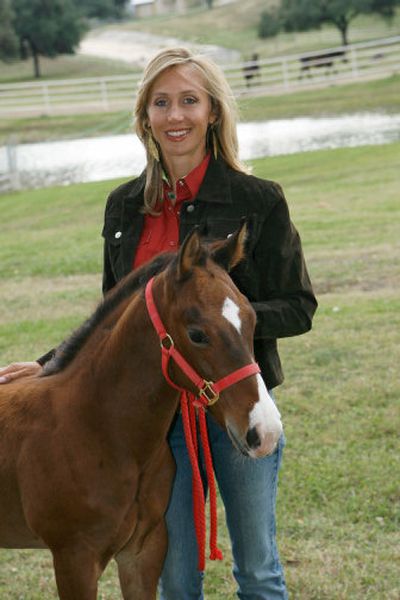Champion racing horse cloned

AUSTIN, Texas – Barrel racer Charmayne James knew scientists had figured out how to clone mice, sheep and cats. But if any creature deserved to be cloned, she thought it was her gelding Scamper, the retired 10-time world champion.
The result, Clayton, has exceeded James’ expectations. The foal even bristles, just like Scamper, when touched on a certain spot behind his ear.
“Scamper was one of the greatest horses ever, and I know that now more than ever,” James said. “I wanted to get in and save his genetics, because if they were ever able to clone a horse, Scamper would be the horse to clone.”
James paid an Austin-based ViaGen Inc. $150,000 to clone Scamper. After four failed attempts, Clayton was born Aug. 8. His birth had been kept secret until Wednesday.
Genetic material was extracted from a cell sample taken from Scamper, then transferred to an egg that had its own genetic material removed. An embryo was grown in an incubator before it was transferred to a mare.
The foal is almost identical to the older model, except for white markings between Clayton’s eyes.
“He looks so much like Scamper, when I walked into the stall and looked at him, the hair on the back of my neck stood up,” James said.
Scamper won a record 10 Professional Rodeo Cowboys Association world championships from 1984 to ‘93 and helped make James the first million-dollar cowgirl and the all-time leading money winner in barrel racing. Scamper is the only barrel racing horse in the Pro Rodeo Hall of Fame.
James, who lives in Athens, Texas, plans to breed Clayton to help “get better, sounder quality barrel horses out there.” For now, she has no plans to race Clayton, saying he’s too valuable to risk getting hurt.
The PRCA has no limits on using cloned horses in competition, but Clayton wouldn’t be allowed in any events sponsored by the American Quarter Horse Association, which does not register horses that are cloned or their offspring.
The first cloned horse was born in 2003 in Italy. In 2005 Texas A&M University created the first cloned horse in the United States. Earlier this year, ViaGen announced it had cloned two top-earning cutting horses in Oklahoma.